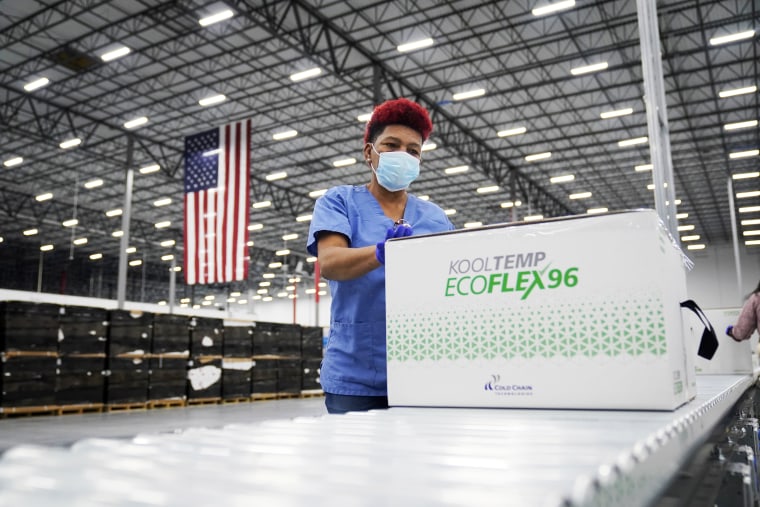WASHINGTON — The White House commitment to ship millions of doses of Covid-19 vaccines abroad has generated diplomatic and logistical challenges for administration officials to untangle as more countries seek U.S. assistance to overcome dire vaccine shortages.
Since President Joe Biden announced this month that 80 million shots would be shipped abroad by the end of June, the White House has yet to send out any of the doses because of a variety of hurdles from logistical to regulatory. In the meantime, infections are surging in countries from Haiti to Japan, which struggle with organizational challenges and have only a small fraction of the doses they need.
With demand for the shots waning and half of adults fully vaccinated, the U.S. has the excess supply to use for vaccine diplomacy. About 70 million doses of the Pfizer, Moderna and Johnson & Johnson vaccines have yet to be administered, according to data from the Centers for Disease Control and Prevention. But determining where those doses should go and getting them where they need to be is a herculean task, said a person familiar with the process.
The federal government has been sending out doses as soon as they leave manufacturing plants to tens of thousands of retail pharmacies, vaccination centers and community health clinics across the country. That means there isn't a central place where millions of doses are stored and can readily be packed up and put on planes.
White House Covid-19 coordinator Andy Slavitt said Wednesday that the U.S. is trying to move to a "tighter distribution system" so the federal government can keep better track of doses and export any additional ones.
There is also the challenge of transporting tens of millions of doses around the globe, ensuring that there are enough planes and making sure that the doses are properly stored and that the countries receiving them have the infrastructure to refrigerate and distribute them, an administration official said.
The official said the administration should have an update in the coming days on where some of the doses are headed.
Another potential big problem is getting Food and Drug Administration authorization for the AstraZeneca vaccine. Of the 80 million doses pledged so far, 60 million were to have come from AstraZeneca — but the administration says it won't release those doses until the vaccine has been cleared by U.S. regulators, even though it has been approved for use in other countries.
The FDA review process has been delayed by issues with AstraZeneca's study data, and it is unclear when — or even whether — AstraZeneca's vaccine will get the green light.
Then there is the delicate diplomatic balance of trying to determine which countries should get doses and how many as numerous key allies grapple with shortages. It's an issue Biden is likely to be pressed about when he meets with world leaders next month at the G7 gathering in the U.K., his first major moment on the international stage.
While Biden has said the U.S. won't use the doses to secure favors from other countries, he acknowledged that the move is a valuable diplomatic tool to counter China's and Russia's efforts to gain influence with their vaccines.
"There's a lot of talk about Russia and China influencing the world with vaccines. We want to lead the world with our values, with this demonstration of our innovation, ingenuity and the fundamental decency of the American people," Biden said in announcing the move this month. "Just as in World War II America was the arsenal of democracy, in the battle against Covid-19 pandemic our nation's going to be the arsenal of vaccines for the rest of the world."
After a recent meeting with the president of South Korea, where just about 3 percent of the population has been fully vaccinated, Biden said the U.S. would provide 500,000 doses to vaccinate service members who work with U.S. troops stationed in the country.
The administration has said little about its criteria to determine what countries get doses and how many, aside from the broad principle of sending them where the most lives can be saved.
"Those decisions are being made on two factors: science and public health, and equity — and no other factors," Slavitt said.
One of the countries in desperate need is Haiti: No vaccinations have yet been administered, and while there are no good data about how many people have been infected, public health officials say cases are on the rise.
The Haitian government announced that it would accept 130,000 doses of the AstraZeneca vaccine from the international aid group COVAX, which the country had previously rejected; the doses could arrive in June, according to the Pan American Health Organization.
But that is only a small fraction of what's needed for the country's 11 million people. Public health workers say the single-dose Johnson & Johnson vaccine would make the most sense for Haiti, where persuading the population to get two AstraZeneca shots might be a challenge.
Biden has assigned Jeffrey Zients, the White House coronavirus response coordinator, to lead the efforts. He is also working with national security adviser Jake Sullivan and Gayle Smith, the coordinator of the global Covid-19 response for the State Department. Staff members at the U.S. Agency for International Development and the Department of Health and Human Services are also involved.
The White House has said it is working with the World Health Organization and COVAX, which is working to get vaccines to lower- and middle-income countries, to make sure the doses are distributed equitably.
An administration official acknowledged the challenges of the rollout, saying the commitment is likely to be just the start.
That's because the 80 million doses — five times what any other country has committed — would be a drop in the bucket of what international organizations say is needed. COVAX has set a goal of distributing 1.8 billion shots to lower- and middle-income countries this year.

